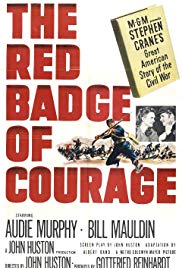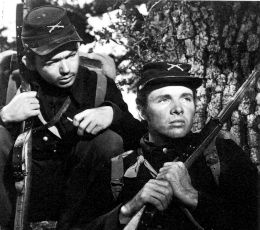THE RED BADGE OF COURAGE
SUBJECTS — U.S./1860 – 1865; Literature/U.S.;
SOCIAL-EMOTIONAL LEARNING — Courage in War; Redemption; Coming of Age;
MORAL-ETHICAL EMPHASIS — Responsibility.
AGE: 10+; Drama; 1951; 70 minutes; B & W.
There is NO AI content on this website. All content on TeachWithMovies.org has been written by human beings.

SUBJECTS — U.S./1860 – 1865; Literature/U.S.;
SOCIAL-EMOTIONAL LEARNING — Courage in War; Redemption; Coming of Age;
MORAL-ETHICAL EMPHASIS — Responsibility.
AGE: 10+; Drama; 1951; 70 minutes; B & W.
TWM offers the following worksheets to keep students’ minds on the movie and direct them to the lessons that can be learned from the film.
Film Study Worksheet for Social Studies Classes for a Work of Historical Fiction and
Worksheet for Cinematic and Theatrical Elements and Their Effects.
Teachers can modify the movie worksheets to fit the needs of each class. See also TWM’s Historical Fiction in Film Cross-Curricular Homework Project.
This adaptation of Stephen Crane’s classic novel follows the experience of a raw recruit to the Union Army through his first two days of battle. At the beginning he is terrified and runs away. The film shows how he comes back and claims both his self-respect and his manhood.

Selected Awards:
1951 National Board of Review Awards: Ten Best Films of the Year.
Featured Actors:
Audie Murphy, Bill Mauldin, Douglas Dick, Royal Dano, Andy Devine, Robert Easton Burke, Arthur Hunnicutt.
Director:
John Huston.
This film shows how, even if you prove a coward in one battle, you can redeem yourself in the next. It shows a boy coming to manhood in battle and what battles were like in the Civil War. The novel is a classic and children should be encouraged to read the book before they see the film.
None.
Ask and help your child to answer the Quick Discussion Question.
The Civil War resulted in unprecedented bloodletting on both sides. No previous war had seen thousands upon thousands of soldiers killed in battle after battle. Soldiers and officers were unprepared for this carnage. See Helpful Background Sections to Gettysburg and Glory. Watching The Civil War, a nine-part documentary on the Civil War will also provide an excellent background on the Civil War.
1. See Discussion Questions for Use With any Film that is a Work of Fiction.
2. When Fleming was standing sentry in the moonlight by the river, why did the rebel soldier call to him to go back into the shadows? Why didn’t the rebel soldier just shoot him?
3. What types of guns were the soldiers using? How did they work?
4. Why was the soldier trying to take the pig? Was this legal? Have you ever heard the term “live off the land” or “requisition?” What do they mean?
5. What was so important about taking the Confederate flag?
1. Why did the soldiers in the regiment think at first that they had lost half their men but realize later that only a few had been killed?
2. What is a little red badge of courage as the term is used in this film?
3. Why did the officers drill and drill the soldiers until the soldiers were sick of it?
4. Remember that just before the Union soldiers charged, the drummer boys started playing their drums. What was the purpose of the drummers?
5. Why were officers posted to positions behind the lines during each battle?
6. After Henry ran away, he heard a bird singing and threw a stick at it. Then, at the end of the movie, after Henry had been carrying the flag, he heard another bird singing and had a different reaction. Why?
7. When Henry came back to the front lines, why wasn’t it enough for him to simply stand and fight like most of the other soldiers? Why did he put himself in special danger?
8. Why did Henry confess to Wilson? Why didn’t he make a full confession?
Discussion Questions Relating to Ethical Issues will facilitate the use of this film to teach ethical principles and critical viewing. Additional questions are set out below.
(Do what you are supposed to do; Persevere: keep on trying!; Always do your best; Use self-control; Be self-disciplined; Think before you act — consider the consequences; Be accountable for your choices)
1. What Pillar of Character was Henry honoring when he came back to his regiment and fought?
Suggested Response:
There are a number of additional pillars that his actions could relate to, including Trustworthiness and Citizenship.
The Red Badge of Courage is an excellent book for young readers. Other historical novels dealing with this period include: A Dangerous Promise: The Orphan Adventures, by Joan Lowery Nixon; Behind the Lines, by Isabell Holland; Mountain Valor, by Gloria Houston; and Jim-Dandy, by Hadley Irwin. For a nonfiction book about the Battle of Bull Run that has been recommended for children 10 – 14 years, see Bull Run, by Paul Fleischman. Also recommended are: Prelude to War edited by Carter Smith and Behind the Lines also edited by Carter Smith.
This Learning Guide was last updated on December 17, 2009.